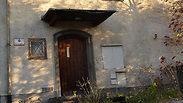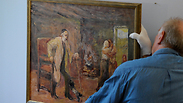
Gurlitt's Salzburg property
Photo: AFP

A Nazi-looted painting (archives)
Photo: AP
A German pensioner's decision to let experts check his art trove for Nazi-looted treasures contrasts sharply with the approach of some museums that may hold works stolen from Holocaust victims, a former minister said on Tuesday.
Over 2,000 German museums hold works created before 1945 and acquired after the Nazis came to power in 1933, according to the Institute for Museum Research in Berlin. Some of them could have been looted or extorted from Jewish owners by the Nazis.
Related stories:
- Kiefer: Jewish collectors boosted my career
- Tate to return Nazi-looted Constable painting
- German recluse Gurlitt to return Nazi-looted art
But only 285 museums, or less than five percent, have researched the ownership history of such works.
"It's not as if museums haven't been doing anything, but because of budget issues, they haven't done as much as they could have," Michael Naumann, a former German culture minister, told Reuters on Tuesday.
Elderly recluse Cornelius Gurlitt, whose hoard of some 1,400 art works was discovered in February 2012 in his Munich flat and confiscated by authorities in a tax probe, agreed on Monday to allow a task force of art experts to study the collection.
In exchange for his cooperation Gurlitt, whose art dealer father took orders from Adolf Hitler to buy and sell so-called 'degenerate art' to fund Nazi activities, will get back those works whose provenance is not in doubt.
Gurlitt also agreed to waive Germany's 30-year statute of limitations, under which he could be considered the legal owner of the paintings.
Accelerate research
Gurlitt's move should "inspire those who own looted art to act morally", Naumann said. But he added there should also be legislative possibilities to accelerate provenance research.The German government and the state of Bavaria have agreed to pay for research of the works found in Gurlitt's apartment and for any additional works not yet confiscated.
In January, World Jewish Congress President Ronald Lauder accused German museums of neglecting their duty to come clean about works they hold that were looted from Jews by the Nazis.
"They know what's been stolen," Lauder told Reuters in an interview during a visit to Berlin. "And what they've been doing is turning a blind eye."
Since 2008, Germany's Bureau for Provenance Research has offered funds to study the ownership of cultural artifacts in public collections. As of January 2013, only 58 applications from museums had been submitted.
In an interview with Spiegel Online last month, Monika Gruetters, Germany's culture minister, said she had doubled the bureau's 2014 budget for such projects to four million euros ($5.52 million), with additional resources and structures planned for 2015.
She said experience gained through the research of Gurlitt's collection would help guide a future national centre she hoped to establish to support public organisations in the search for Nazi-looted art in their collections.















